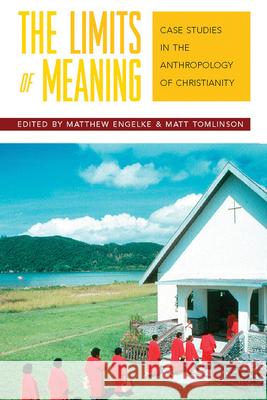The Limits of Meaning: Case Studies in the Anthropology of Christianity » książka
The Limits of Meaning: Case Studies in the Anthropology of Christianity
ISBN-13: 9781845455071 / Angielski / Miękka / 2007 / 252 str.
The Limits of Meaning: Case Studies in the Anthropology of Christianity
ISBN-13: 9781845455071 / Angielski / Miękka / 2007 / 252 str.
(netto: 138,34 VAT: 5%)
Najniższa cena z 30 dni: 140,79 zł
ok. 22 dni roboczych.
Darmowa dostawa!
"Christian theology has given to the human sciences at large hermeneutics as an interpretive science of meaning. This remarkable collection of essays by anthropologists turns a keen hermeneutic sensibility on Christian discourse and practice itself, and in the process not only makes an important contribution to the ethnography of Christianity, but also offers a profound meditation on the theory of meaning." Thomas Csordas, University of California - San Diego "The Limits of Meaning is by far the best instance I've seen of the fresh and powerful insights anthropologists are bringing to the study of Christianity. The fascinating ethnographic case studies, along with a fine Introduction by the editors and commentary by Joel Robbins, highlight the crucial importance of meaning for Christianity by focusing on points where it is most at risk or fails utterly. Extremely readable while advancing a sophisticated theoretical argument that links the deeper dynamics of Christianity with its local manifestations, this book challenges conventional understandings and opens new avenues of research. It deserves to be on the bookshelves of all serious students of contemporary world Christianity." John Barker, University of British Columbia Too often, anthropological accounts of ritual leave readers with the impression that everything goes smoothly, that rituals are "meaningful events." But what happens when rituals fail, or when they seem "meaningless"? Drawing on research in the anthropology of Christianity from around the globe, the authors in this volume suggest that in order to analyze meaning productively, we need to consider its limits. This collection is a welcome new addition to the anthropology of religion, offering fresh debates on a classic topic and drawing attention to meaning in a way that other volumes have for key terms like "culture" and "fieldwork." Matthew Engelke is a lecturer in the Department of Anthropology, London School of Economics. He has conducted research in Zimbabwe and published numerous articles in leading journals, focusing on Christian ritual, conversion, spirit possession, and textual authority. He is coeditor with Marshall Sahlins of Prickly Paradigm Press. Matt Tomlinson is an assistant lecturer in Anthropology at Monash University. He has conducted research in Fiji on Christianity's role in village and national politics, especially in relation to traditional chiefly systems and coups d'etat. He has published in American Anthropologist, Journal of the Royal Anthropological Institute, and Oceania.
"Christian theology has given to the human sciences at large hermeneutics as an interpretive science of meaning. This remarkable collection of essays by anthropologists turns a keen hermeneutic sensibility on Christian discourse and practice itself, and in the process not only makes an important contribution to the ethnography of Christianity, but also offers a profound meditation on the theory of meaning." Thomas Csordas, University of California - San Diego"The Limits of Meaning is by far the best instance Ive seen of the fresh and powerful insights anthropologists are bringing to the study of Christianity. The fascinating ethnographic case studies, along with a fine Introduction by the editors and commentary by Joel Robbins, highlight the crucial importance of meaning for Christianity by focusing on points where it is most at risk or fails utterly. Extremely readable while advancing a sophisticated theoretical argument that links the deeper dynamics of Christianity with its local manifestations, this book challenges conventional understandings and opens new avenues of research. It deserves to be on the bookshelves of all serious students of contemporary world Christianity." John Barker, University of British ColumbiaToo often, anthropological accounts of ritual leave readers with the impression that everything goes smoothly, that rituals are "meaningful events." But what happens when rituals fail, or when they seem "meaningless"? Drawing on research in the anthropology of Christianity from around the globe, the authors in this volume suggest that in order to analyze meaning productively, we need to consider its limits. This collection is a welcome new addition to the anthropology of religion, offering fresh debates on a classic topic and drawing attention to meaning in a way that other volumes have for key terms like "culture" and "fieldwork."Matthew Engelke is a lecturer in the Department of Anthropology, London School of Economics. He has conducted research in Zimbabwe and published numerous articles in leading journals, focusing on Christian ritual, conversion, spirit possession, and textual authority. He is coeditor with Marshall Sahlins of Prickly Paradigm Press. Matt Tomlinson is an assistant lecturer in Anthropology at Monash University. He has conducted research in Fiji on Christianitys role in village and national politics, especially in relation to traditional chiefly systems and coups détat. He has published in American Anthropologist, Journal of the Royal Anthropological Institute, and Oceania.











